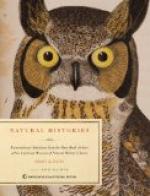Off jumped the grasshopper in a moment, and fell so lightly on the grass it did not hurt him in the least, though it was as far as if Bevis had tumbled down out of the clouds. Bevis tried to catch him, but he jumped so nimbly this way and that, and hopped to and fro, and lay down in the grass, that his green coat could not be seen. Bevis now went down to the brook and stood on the bank, where it was high, near a bush at the side of the drinking place. “Ah, dear little Sir Bevis!” whispered a reed, bending towards him as the wind blew, “please do not come any nearer; the bank is steep and treacherous, and hollow underneath where the water-rats run. So do not lean over after the forget-me-nots—they are too far for you. Sit down where you are, behind that little bush, and I will tell you all about the bathing. The birds come down to bathe every Midsummer Day, and the goldfinches, and the sparrows, and the blackbirds, and the thrushes, and the swallows, and the wrens, and the robins, and almost every one of them, except two or three, whose great-grandfathers got into disgrace a long while ago. The rooks do not come because they are thieves, and steal the mussels, nor the crows, who are a very bad lot; the swan does not come either, unless the brook is muddy after a storm. The swan is so tired of seeing himself in the water that he quite hates it, and that is the reason he holds his neck so high, that he may not see more of himself than he can help.”
Soon the birds came. They were all in their very best and brightest feathers, and as the sun shone on them and they splashed the water and strutted about, Bevis thought he had never seen anything so beautiful.
They did not all bathe, for some of them were specially permitted only to drink instead, but they all came, and all in their newest dresses. So bright was the goldfinch’s wing, that the lark, though she did not dare speak, had no doubt she rouged. The sparrow, brushed and neat, so quiet and subdued in his brown velvet, looked quite aristocratic among so much flaunting color. As for the blackbird he had carefully washed himself in the spring before he came to bathe in the brook, and he glanced round with a bold and defiant air, as much as to say: “There is not one of you who has so yellow a bill, and so beautiful a black coat as I have.” In the bush the bullfinch, who did not care much to mix with the crowd, moved restlessly to and fro. The robin looked all the time at Bevis, so anxious was he for admiration. The wood-pigeon, very consequential, affected not to see the dove, whom Bevis longed to stroke, but could not, as he had promised the reed to keep still.
Bevis looked up into the sky, and there was the hawk, almost up among the white clouds, soaring round and round, and watching all that was proceeding. Almost before he could look down again a shadow went by, and a cuckoo flew along very low, just over the drinking place.
“Cuckoo!” he cried, “cuckoo! The goldfinch has the prettiest dress;” and off he went.




